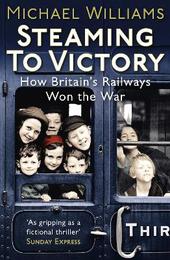
|
Steaming to Victory: How Britain's Railways Won the War
Paperback / softback
Main Details
| Title |
Steaming to Victory: How Britain's Railways Won the War
|
| Authors and Contributors |
By (author) Michael Williams
|
| Physical Properties |
| Format:Paperback / softback | | Pages:400 | | Dimensions(mm): Height 198,Width 129 |
|
| Category/Genre | British and Irish History
Second world war
Trains and railways |
|---|
| ISBN/Barcode |
9780099557678
|
| Classifications | Dewey:385.094109044 |
|---|
| Audience | |
|---|
|
Publishing Details |
| Publisher |
Cornerstone
|
| Imprint |
Arrow Books Ltd
|
| Publication Date |
27 March 2014 |
| Publication Country |
United Kingdom
|
Description
The definitive history of the British railways during the Second World War. In the seven decades since the darkest moments of the Second World War it seems every tenebrous corner of the conflict has been laid bare, prodded and examined from every perspective of military and social history. But there is a story that has hitherto been largely overlooked. It is a tale of quiet heroism, a story of ordinary people who fought, with enormous self-sacrifice, not with tanks and guns, but with elbow grease and determination. It is the story of the British railways and, above all, the extraordinary men and women who kept them running from 1939 to 1945. Churchill himself certainly did not underestimate their importance to the wartime story when, in 1943, he praised 'the unwavering courage and constant resourcefulness of railwaymen of all ranks in contributing so largely towards the final victory.' And what a story it is. The railway system during the Second World War was the lifeline of the nation, replacing vulnerable road transport and merchant shipping. The railways mobilised troops, transported munitions, evacuated children from cities and kept vital food supplies moving where other forms of transport failed. Railwaymen and women performed outstanding acts of heroism. Nearly 400 workers were killed at their posts and another 2,400 injured in the line of duty. Another 3,500 railwaymen and women died in action. The trains themselves played just as vital a role. The famous Flying Scotsman train delivered its passengers to safety after being pounded by German bombers and strafed with gunfire from the air. There were astonishing feats of engineering restoring tracks within hours and bridges and viaducts within days. Trains transported millions to and from work each day and sheltered them on underground platforms at night, a refuge from the bombs above. Without the railways, there would have been no Dunkirk evacuation and no D-Day. Michael Williams, author of the celebrated book On the Slow Train, has written an important and timely book using original research and over a hundred new personal interviews. This is their story.
Author Biography
Michael Williams writes widely on railways for many publications, including the Daily Mail, The Independent, the Independent on Sunday, the New Statesman, The Oldie and the railway specialist press. He is a veteran Fleet Street journalist, having held many senior positions, including Deputy Editor of the Independent on Sunday, Executive Editor of the Independent and Head of News at The Sunday Times. He is currently Senior Lecturer in the School of Journalism, Media and Communication at the University of Central Lancashire. He commutes regularly by train on the 440-mile return journey between his home in London's Camden Town and his office at Preston in Lancashire.
ReviewsAs gripping as a fictional thriller...It is the human tales of evacuees, locomotive cleaners, crews, porters and ticket collectors that make this such an enthralling read...Michael Williams has written this book in an easy reading graphic style bringing to life the heroics and anecdotes of those he interviewed. His journalistic style makes this a compelling read 4 stars * Sunday Express * Thoroughly researched...a good summary of the character shown by railwaymen and women * Daily Mail * Stirring, awe-inspiring and quirky. 4 stars * The Scotsman * An elegant evocation of the wartime railways, a facet of Britain's richly detailed 'home front' story that deserves the prominence that this book will help to attain. * BBC History Magazine * Michael Williams has written a highly readable book and one that is accessible to all. * Britain at War magazine * Books about railway history seem to appear in an endless stream, so it is a real pleasure to find one that not only has something new to say, but tells its story with style and enthusiasm. * Who Do You Think You Are? magazine * a compelling, easy read, and one that provides an excellent overview of a huge and complex subject * Steam Railway * Comprehensive and compelling * Christian Wolmar * Hugely enjoyable -- David Edgerton, Prof of Modern History, Imperial College, author of Britain's War Machine compelling and accessible * Railway Magazine * A change to my diary found me returning home from York this morning by train and bus, so I took the opportunity to start reading your manuscript. I enjoyed so much what I was reading that I kept going through the afternoon and finished it off. I think you're on to a winner! * Professor Colin Divall Institute for Transport Studies, York University * an interesting contribution to social as well as railway history * Railnews * hugely readable...Williams has written this book that is both informative and scholarly but also easy read and that brings to life the heroics and anecdotes of the many railways workers he interviewed in the writing of this book. His style makes this a compelling read... All in all it's a important book that fills a gap in the story not just of Britain's railways but also of the Second World War on the home front. * My Dad Rocks * highly readable 4 stars * Daily Express * Fresh and accessible - makes you feel you were there * Railway Magazine *
|